Is Jürgen Klopp the perfect leader?
With Jürgen Klopp leaving Liverpool FC, many people praise his leadership skills. Rightly so. What can we learn from his reign at the club?
Jürgen Klopp
It is not often that the Financial Times, known for its diligent reporting on all things business, spends a leading opinion piece on sports. Or on football. The European version of it, of course, not what the Americans call football (because that isn’t football, respectfully 😉). And in this case, the opinion piece from Simon Kuper was called Jürgen Klopp’s departure holds lessons for leaders everywhere (paywall). It appeared on January 26th, 2024, just after the Klopp announced that he was leaving Liverpool Football Club.
The world’s press, and not just the sports press, wrote many an article on ‘what’s next for Liverpool FC’, ‘the end of an era’ and so on. Comparisons were made to the departure of the great Alex Ferguson from Manchester United in 2013 and the impossibility to replace him at the helm of that club. Indeed, 11 years later, Man U are still not even near its then best.
So, what makes Klopp such an effective football manager? What is it in his leadership that make him stand out?
I quote the FT article above, because I think that Simon Kuper has some excellent pointers that I would like to explore here in the context of our own organisations. And I want to use those pointers to create the Klopp Leadership Model (KLM, not to be confused with the Dutch Airline 😉).
Klopp Leadership Model (KLM)
To translate the elements in Kuper’s article in a model, I will express it in eight dimensions.
Let’s look at those dimensions in more detail.
Identity
In the FT article, Kuper starts with stating that “[Klopp] turned himself into the embodiment of the institution he led.” As a German, Klopp did not come from the tight Liverpool FC (LFC) background. He is no scouser, like -for instance - club legend Steven Gerrard. But, he worked hard to understand the people that make up the club. His behaviour on and off the pitch (his emotions, his jumping up and down along the line, the hugs he gave people) endeared him with the notoriously difficult to please LFC supporters. In the words of Simon Kuper:
There is a lot in this that expresses, in my words, a deep feeling of identity with the project Klopp was part of. Which leads me to the first lesson we can pick up from Klopp.
Klopp Lesson 1 - At all times make the environment you work in, the things we are trying to do together, the team we are with, part of your own identity and, complicitly, make yourself an inherent part of that environment.
Empathy
Klopp always shows a deep interest in the players; “he treated his players and staff as humans, not as mere instruments for his own success” (Kuper). He made sure he knew everything about the players, their families, their life events and so on. This, of course, creates very high levels of trust. But also, it avoids the trap of solely acknowledging the utility of the players. This resonates strongly with me and it is one of the reasons, for instance, why I try to avoid (when I can) the term Human Resources. It sounds, indeed, human, but it equates people with other resources, like machines. Klopp clearly and consciously stayed away from that.
That’s much more difficult in an environment like the high pressure top football environment -where every word, smile, hick-up, etc., is measured out on the front pages of newspapers, and headlines on social media - than it is in most of our business lives.
But the lesson is clear.
From my own experience, in the workshops that I often facilitate, there are very difficult issues to be addressed, often with diametrical opposed views that people hold very dear to their hearts that require some form of reconciliation. So, when I introduce myself as the first of the group, I always start with my name, that I am Dutch but that I live in Barcelona, that my partner is Polish (who also has a business in Poland), that my two daughters live in England and that that international dimension is not always easy. By introducing ‘human’ elements of my life first, I invite others to do the same and avoid them saying ‘I am Lucy, and I am the accountant’, forgetting that they are humans (rather than the job title) first. After all, it is much more difficult to dismiss the views of someone you know as a person than of ‘an instrument’ (see Kuper’s quote above) to achieve business success. You will automatically show more empathy of where they might come from.
Klopp Lesson 2 - Make sure you see and recognise that your team members are the human beings they are. Try to understand where they come from, what drives them and that work is only part of their lives.
Harmony
For all my sins (but in complete resonance with the part of the world I live in!) I am an FC Barcelona supporter, a so called culer. A ‘dark’ day in our recent history was May 7th, 2019 when we played the return leg of the European Champions League (ECL, the main European club football trophy) against Liverpool at their home ground, Anfield. We had won our home leg 3-0 with a great display and the return would be a formality, surely.
We lost 4-0 after an awesome Liverpool display, and we were out of the ECL.
How was this possible? Liverpool were down and out after the first leg and somehow turned it around!
It transpired that, after the 3-0 defeat in Barcelona, Klopp came into the changing room all smiles, seeing all the players’ faces black and hopeless, saying: “Boys, boys! We are not the best team in the world. Perhaps Barça are, but we don’t care! We try again at home, and -who knows - we will beat them!”. Somehow, Klopp found the words that resonated very well, at that moment in time, with the players.
When you are able to find language that resonates with players and other stakeholders (like the fans!), you create a harmony between all involved. Instead of seeking to blame people for things that go wrong, you share a common ground and move forward together.
I suggest that Klopp was able to do that, because he identified with the club and shows genuine empathy towards players and fans alike.
Klopp Lesson 3 - At all times join the continuously ongoing conversation with all stakeholders in your organisation. That way, your understanding of what is going on and what neeeds to happen converges, and your language starts to resonate with each other’s day-to-day experiences, create a harmony that is unstoppable.
Decisiveness
Because of his deep identification with the club (and vice versa), the deep levels of empathy he showed and his way of finding resonance in the conversations with all the club’s stakeholders, Klopp was able to make ruthless decisions without making enemies (Kuper). This is best demonstrated with his team choices.
Unlike many of his rival at other clubs, Klopp was known to not be tempted by big names for this team, but get those that were right for the team. But, in 2018, he made an exception and insisted, that he wanted the Dutch central half Virgil van Dijk, for the (then extraordinarily high) price of £85 million. The deal for van Dijk was highly controversial but Klopp refused to look elsewhere for the centre half he believed he desperately needed, and he held out for it. History proved him right.
But, his decisiveness also had another side. Look for instance at this quote from The Guardian.
The highlighted phrase makes perfectly clear who makes the decisions around here.
Which brings us to the next lesson.
Klop Lesson 4 - Build on your resonance, respect and trust with your team and your other key stakleholder, to make the ruthless decisions you believe are required to be successful.
Delegation
Modern football managers are much like the CEO of large companies. They need to provide the guiding vision (Kuper) for the team (for Liverpool that is about a high paced, high pressure game - Kuper), but they leave the implementation and execution of that vision to specialists and experts. For instance, LFC has a throw-in coach (I did not even know that could be a thing). See, again, this quote from the same article in The Guardian.
This highlights who makes the decisions (see above), but also that it is key to find the right people around you.
Coming back to assembling the team meant for success, Klopp relied on his club’s analysts to hire the Egyptian striker Mo Salah, against his own judgement. Klopp wanted to hire the German forward Julian Brandt (who?😉 ) instead, but was eventually persuaded by the analysts. Salah has been one of the most successful signings for LFC ever. Kuper mentions that “Klopp later apologised to the analysts for his mistake”.
Klopp Lesson 5 - Surround yourself with trusted specialists and advisors that you can delegate the main elements of the implementation of your strategic vision to. And, if you delegate, you stick with your specialists. That’s why you hired them.
Empowerment
Empowerment is a word heard so often in leadership and management contexts, the word has lost most of its meaning. People need to feel empowered, we say as if that is the panacea for success. But we never say what we think what empowerment really means in our organisations. I suggest, that real empowerment is about giving people permission to fail. This is such an important message.
Going back to that (for us culers) dark day in May 2019 when Liverpool beat Barça 4-0 at Anfield, and Klopp entering the deflated dressing room with the comments mentioned above, [Klopp] was lifting his men, whilst also lifting the pressure: he gave them permission to fail (Kuper).
‘Empowering people’ and then blaming them for mistakes is not empowerment, that is absconding your own responsibility. Giving people permission to fail. means they will not always take the safe route, but try brave, creative things to achieve our goals. Empowerment means that leaders give people space to find the right route, without them not daring to make a move, afraid of the consequences.
Klopp Lesson 6 - Empower your people by openly stating that they are allowed to fail. Give them the space and means to try doing new or unusual things, but support them when things go wrong. Never blame or punish people’s efforts after you have empowered (or delegated to) them to do certain work.
Relativism
Klopp never takes himself and his work too seriously, without losing track of what he is hired to do: maximise the success of Liverpool Football club for all its stakeholders.
Kuper in his FT article offers a wonderful example.
To understand the limits of your expertise and knowledge and to not get drawn into a belief that somehow you are an expert in all and sundry is a key trait.
Contrast that with Elon Musk, who starts to believe that because he is ultra-rich he has knowledge about everything from the Ukraine war to world politics, to brain surgery and so on.
Another example of a misunderstanding of how relative your position is, is when then BP-chief Tony Hayward remarked “I want my life back” to the world media at the height of the oil spill disaster in the Gulf of Mexico. Of course, he apologised, but knowing when to say and, importantly also, when not to say things is a key leadership attribute,
Klopp Lesson 7 - Be aware of your own limitations. Clearly deliniate where your expertise starts and where it stops. And, when challenged, don’t take yourself too seriously, and don’t speak out about matter you are not competent in. But do know when it does matter. Understand the relative impact of what you say at all times.
Self-awareness
And last, but not least, is to be aware of who you are and what you do. When he announced his departure of leaving Liverpool Football Club he said:
“I came here as a normal guy. I am still a normal guy, I just don’t live a normal life for too long now. And I don’t want to wait until I am too old to have a normal life, and I need, at least, to give it a try.”
Being a football manager at such a high profile club, and being in the very spotlight for so many years takes its toll on your private life. Klopp and his family have lived away for all those years from their home. There are limits to what a person can endure. Some managers need the thrill, the attention and the constant pressure, others can only do that for a limited amout of time.
Coincidentally, just one day after Klopps announcement of leaving Liverpool, FC Barcelona’s current manager (Xavi Hernandez, who was not the manager of Barça in 2019, I add) also announced his departure, quoting that the pressures he experienced have a tremendous impact on his private life.
As a Barça supported, I would love Klopp to be the one who takes over from Xavi, but that will never happen. Klopp knows himself and his nearest and dearest well enough to know that next season he will never be joining another high pressure environment. Irrespective of the money he, no doubt, could earn.
Klopp Lesson 8 - Know when you reached your own limits and of those around you. And, when you reached those limits, move aside for someone else to take the reigns.
Conclusion
There are many lessons that leaders can learn from Jürgen Klopp. He is rightly admired for being the great leader he is. In this article, I have tried to create a Klopp Leadership Model (KLM) that provide some good leadership insights for all of us.
But, we cannot look at this model without taking the self-awareness of one’s own expiry date carefully into account. And, having freely quoted from Simon Kuper’s FT Opinion piece in this article, it therefore seems appropriate to finish with another quote from his article:
I salute you, Jürgen Klopp.
Amen.




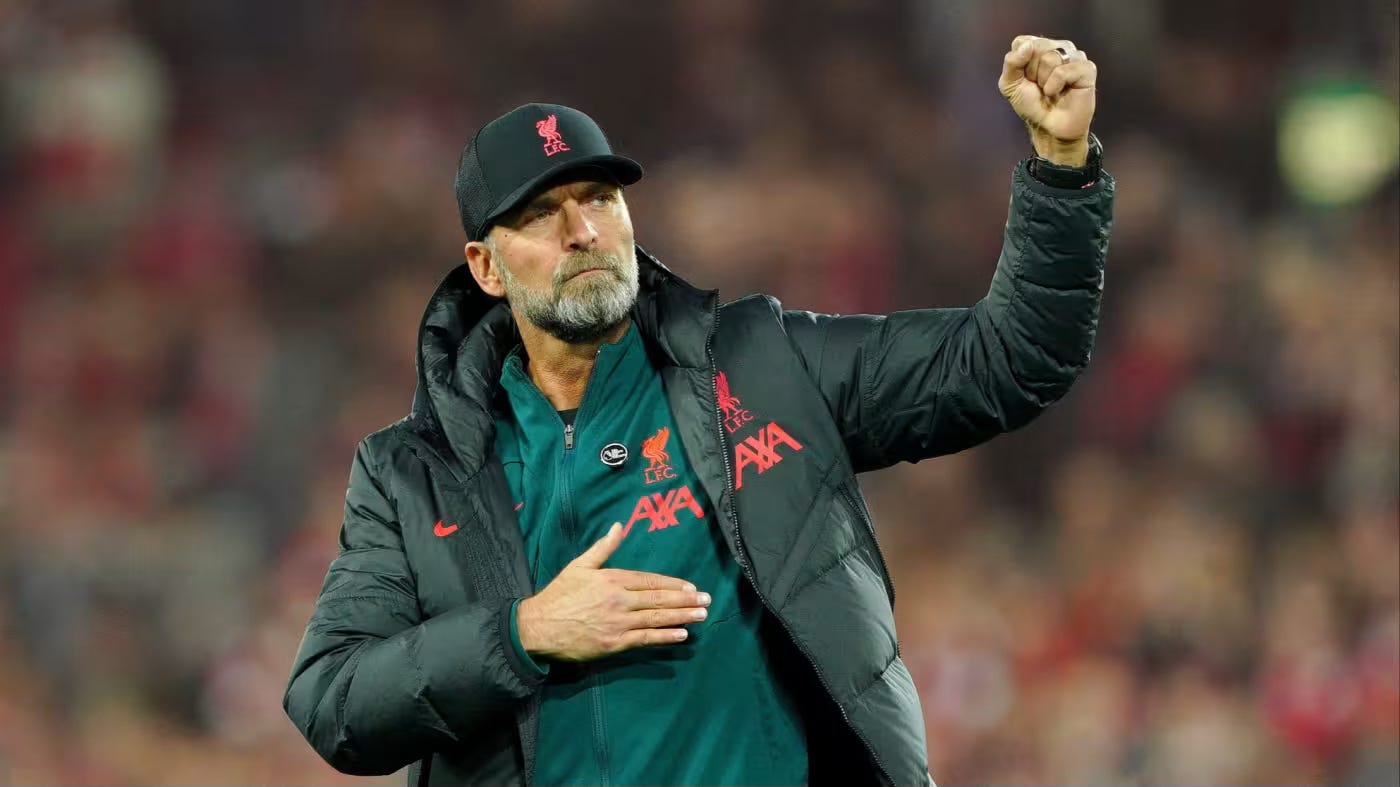
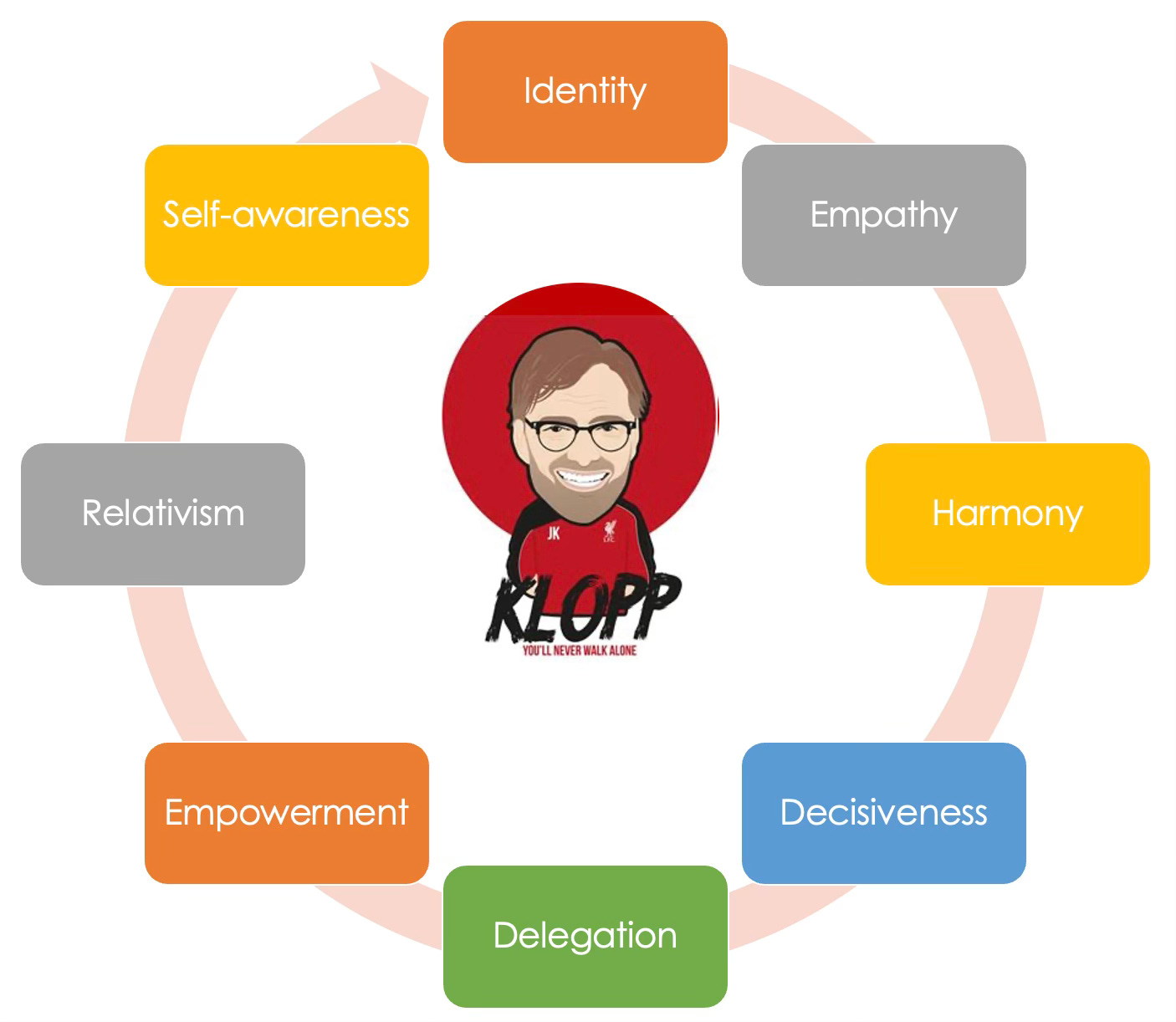

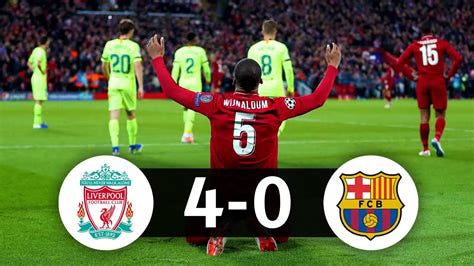
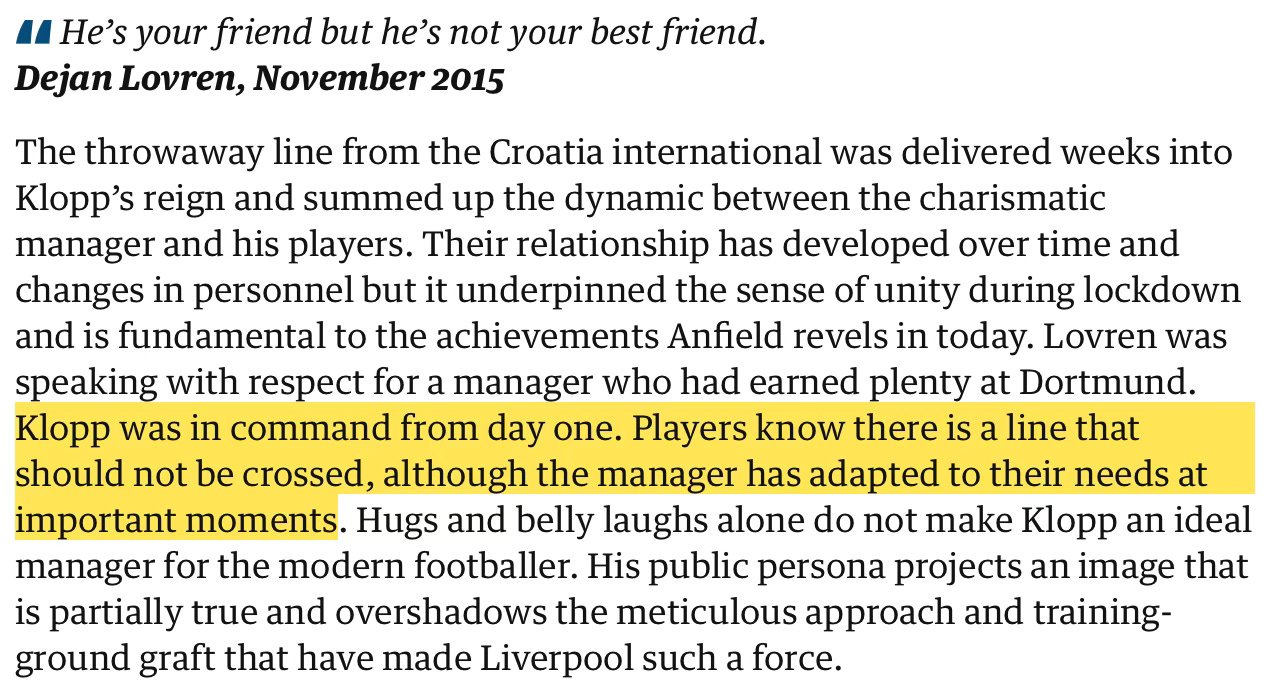
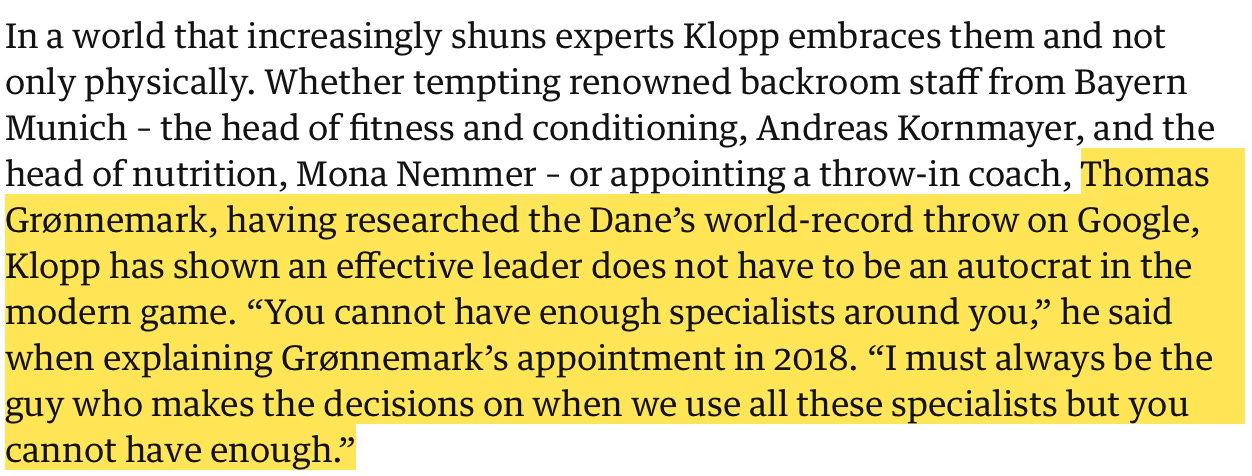
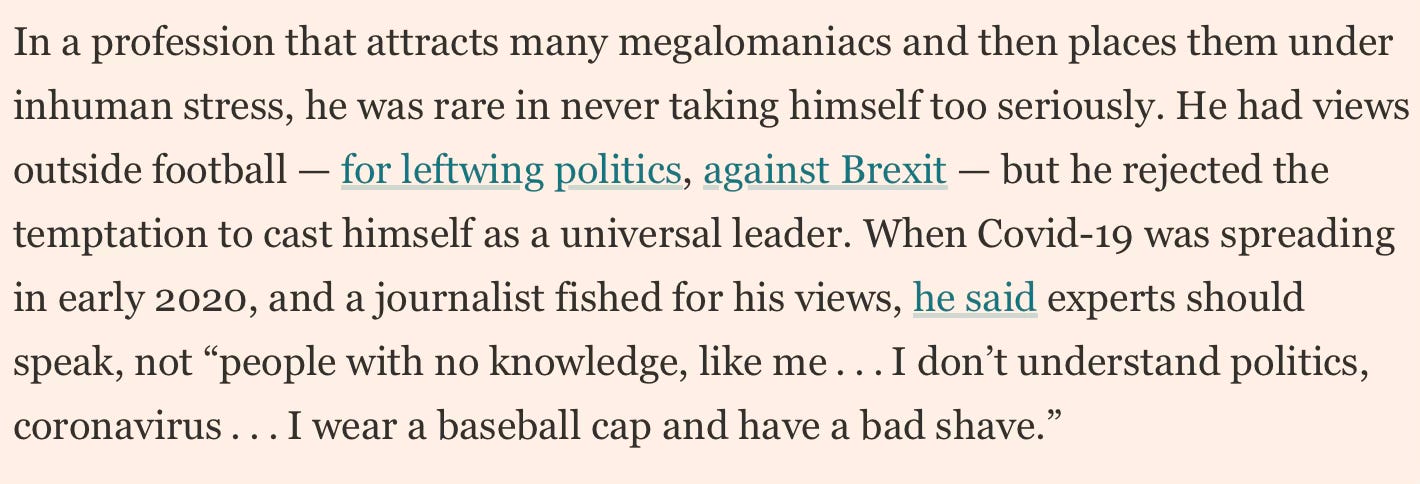

Who will be next, and will it be 11 years of dispair like Man U after Ferguson?
Astute analysis. Klopp has shown a rare mix of soft skills and harder decisiveness and authority. No wonder Liverpool kept winning and looked like they enjoyed it! Who will be next...